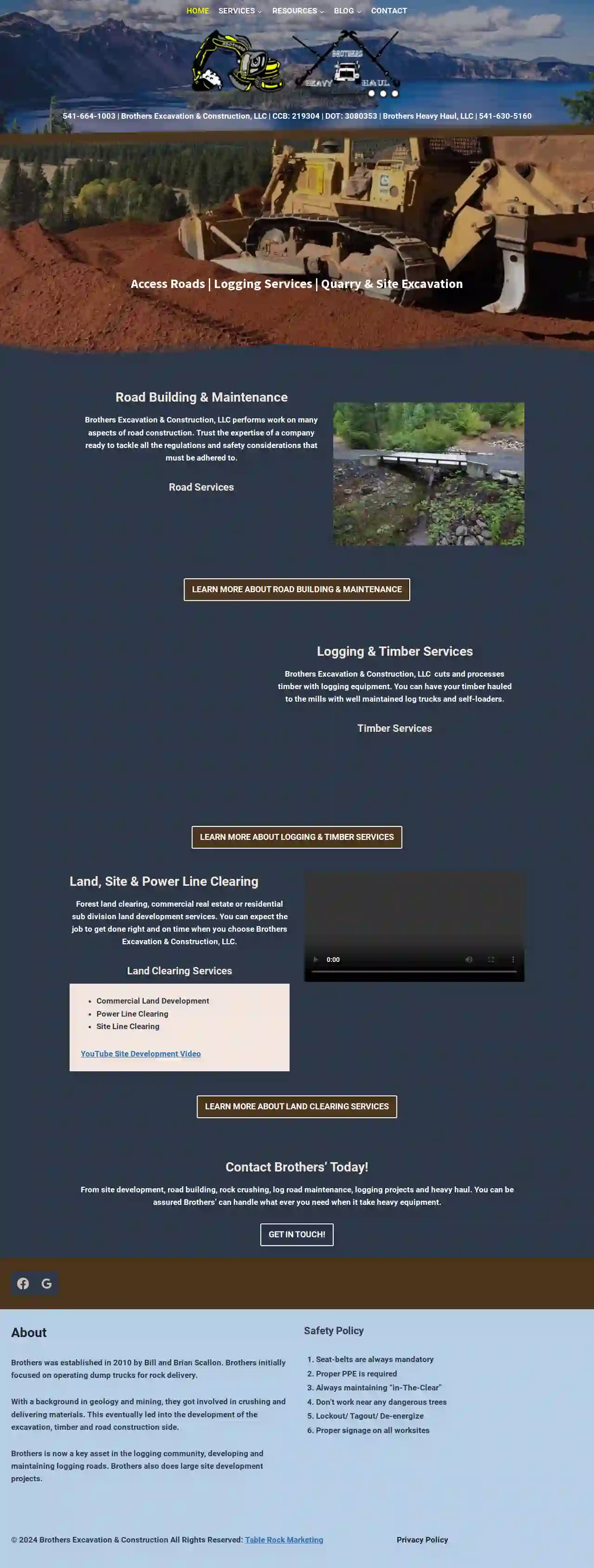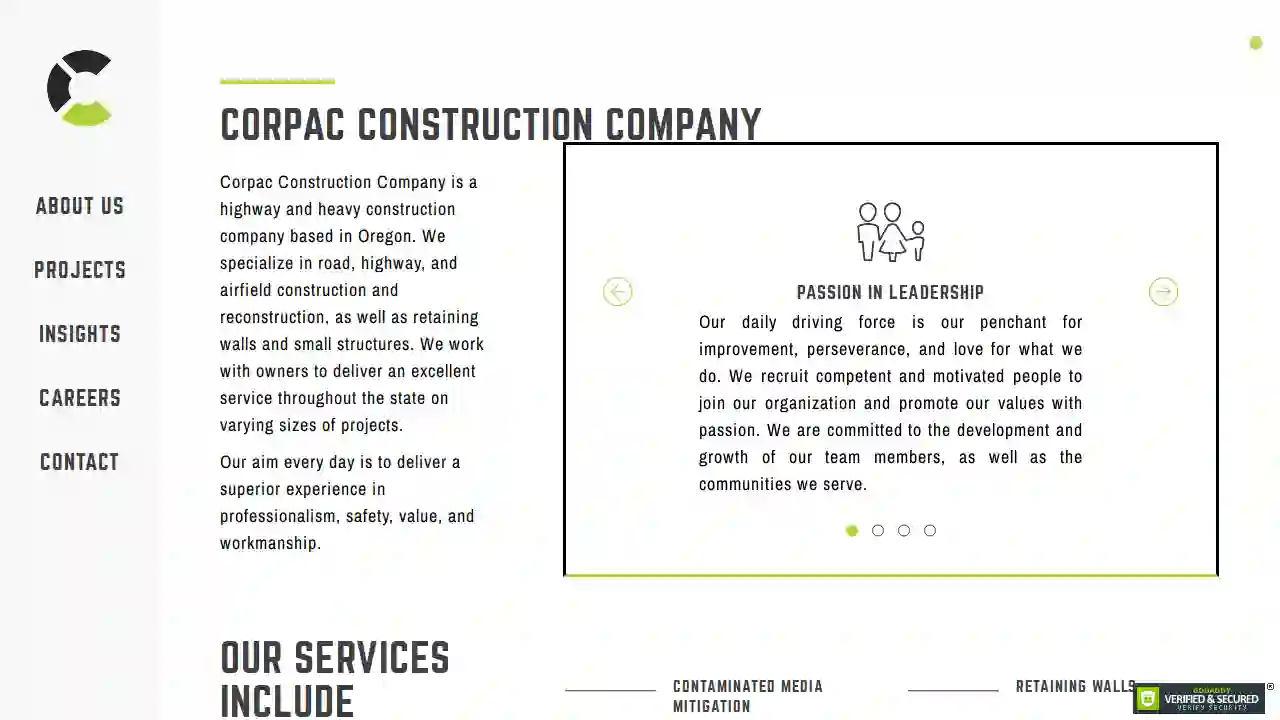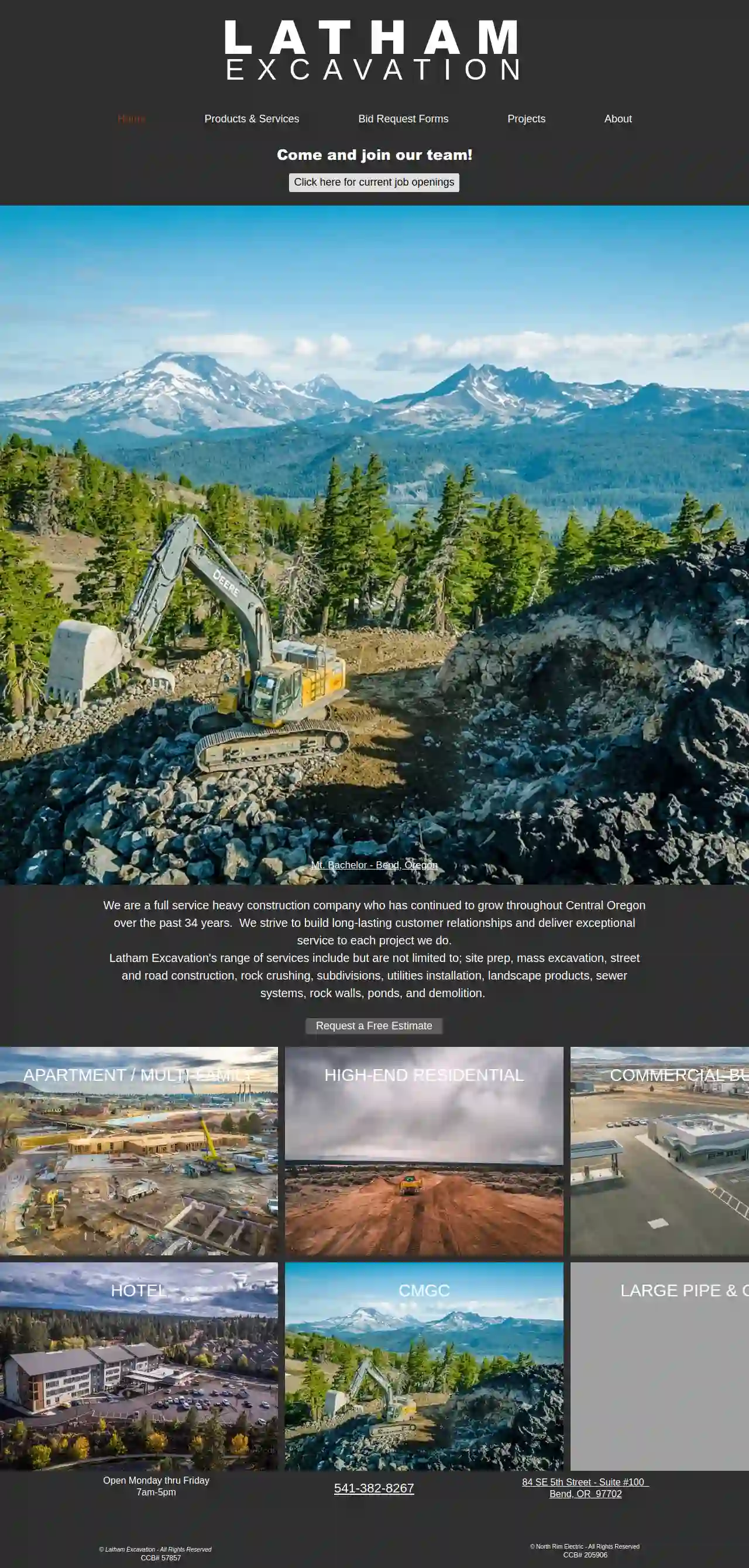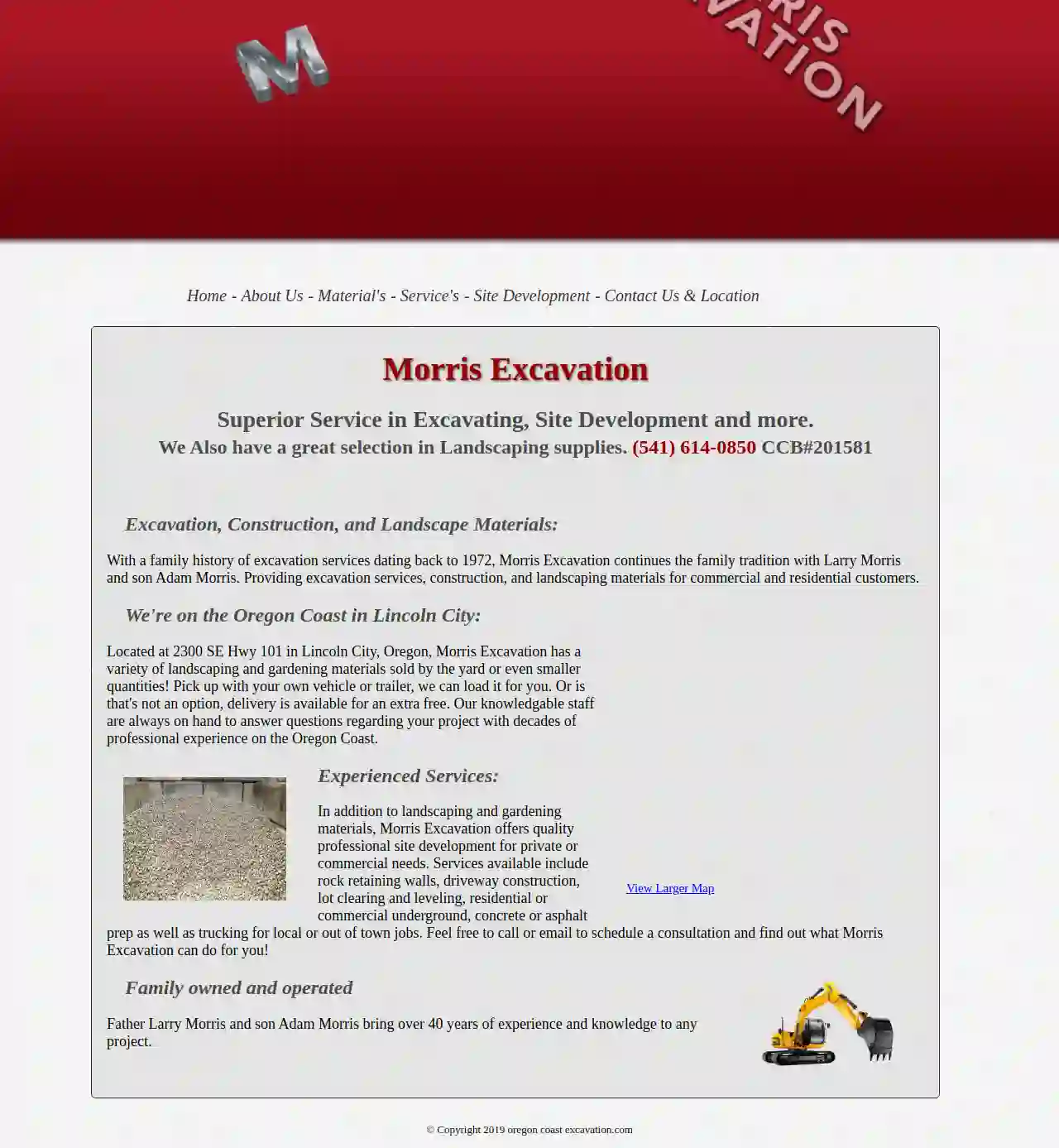Excavation Contractors Biddeford
Top Excavation Contractor in Biddeford
Receive multiple Excavation Contractors Near Me quotes for your project today! Compare profiles, reviews, accreditations, portfolio, etc... and choose the best deal.

Brothers Excavation & Construction, LLC
Portland, USRoad Building & Maintenance Brothers Excavation & Construction, LLC performs work on many aspects of road construction. Trust the expertise of a company ready to tackle all the regulations and safety considerations that must be adhered to. Logging & Timber Services Brothers Excavation & Construction, LLC cuts and processes timber with logging equipment. You can have your timber hauled to the mills with well maintained log trucks and self-loaders. Land, Site & Power Line Clearing Forest land clearing, commercial real estate or residential sub division land development services. You can expect the job to get done right and on time when you choose Brothers Excavation & Construction, LLC. About Brothers was established in 2010 by Bill and Brian Scallon. Brothers initially focused on operating dump trucks for rock delivery. With a background in geology and mining, they got involved in crushing and delivering materials. This eventually led into the development of the excavation, timber and road construction side. Brothers is now a key asset in the logging community, developing and maintaining logging roads. Brothers also does large site development projects. Safety Policy Seat-belts are always mandatory Proper PPE is required Always maintaining “in-The-Clear” Don’t work near any dangerous trees Lockout/ Tagout/ De-energize Proper signage on all worksites
- Services
- Why Us?
- Gallery
Get Quote
Dirtworks Excavation LLC
51 reviews2221 SE 53rd Avenue, Hillsboro, 97123, USWho We Are Welcome to Dirtworks Excavation LLC, your go-to excavation company serving the Pacific Northwest region. We provide top-notch excavation services throughout NW Oregon and SW Washington, catering to projects of all sizes and complexities. Whether you need excavation for residential, commercial, or industrial purposes, we have got you covered. At Dirtworks Excavation LLC, we understand the importance of timely and efficient services. That’s why we are committed to delivering exceptional services that cater to your specific needs and schedule. We work closely with our clients, ensuring that they are updated on every step of the project and that we meet their expectations. We take pride in our highly skilled team of excavation professionals who are equipped with the latest technology and equipment to handle any project. Our team is dedicated to providing you with superior services that meet and exceed your expectations. We know that every project is unique, and that’s why we offer personalized services to ensure that our clients get exactly what they need. Contact us today to discuss your project and receive a free estimate. Our team is ready to help you with your excavation needs, and we guarantee that you won’t be disappointed.
- Services
- Why Us?
- Gallery
Get Quote
Osburn Olson Excavation And Land Development
2207 Dolphin Rd, 2207 Dolphin Rd Warrenton, Warrenton, 97146, USOsburn Olson Excavation Osburn Olson Excavation stands as the premier land developer along the North Oregon Coast. Under the leadership of Ryan Osburn, the company boasts a team with over 50 years of collective experience in developing both residential and commercial projects. Going beyond the traditional scope of excavation, Osburn Olson Excavation offers a comprehensive array of services. These encompass residential home construction, commercial construction, site preparation, land clearing, demolition services, infrastructure development, utility installation, septic tank systems, block retaining wall construction, rock hauling, dirt hauling, site evaluation, and much more. If you seek a seasoned and professional excavation company with decades of expertise, we invite you to get in touch with us today. CORE VALUES Our goal is to provide the best quality services and the lowest possible prices. Our team of experts has over 50 years combined experience in the excavation and construction industry. As a leader in our field in the local area, our team will help you complete your project right the first time. We provide a variety of services including new home construction, excavation, utilities, drainage, retaining walls, block retaining walls, septic systems, and more. Osburn Olson Excavation has a large fleet of excavators for projects big and small. WE HAVE THE TOOLS From the biggest commercial projects to small single family homes, Osburn Olson has the right excavator and tools for the job. CERTIFIED EXPERIENCE With decades of experience in the construction industry, our certified excavation experts will get your job done right the first time. COMPETITIVE PRICING After decades in the construction field, we know how to keep our pricing low to save you money. QUALITY GUARANTEE Rest assured that our team will get your excavation or construction project done right the first time. 50 YEARS EXPERIENCE Our team of construction experts have over 50 years experience building on the Oregon Coast. LASTING RESULTS Over the years we have learned what works and what doesn’t on the Oregon Coast. Site grading and excavation are critical to the success of your construction project.
- Services
- Why Us?
- Our Team
- Gallery
Get Quote
Hal's Construction
4.536 reviews20666 S. Highway 213, Oregon City, 97045, USPracticed, Year-Round Paving Construction in Portland, OR Turn to the experienced services of Hal’s Construction, Inc. for your paving needs. A family-owned business, Hal’s Construction, Inc. can provide you with experienced, loyal employees who provide quality work in a variety of services. We provide year-round paving services—summer or winter, rain or shine. During the winter months, we work on good weather days so we can provide you with top service. Hal’s Construction, Inc. is focused on quality of work and meaningful customer relationships, providing specialty services to your specific needs. With Hal’s Construction, we see our employees as one large team aiming for the same goal. Our employees are not afraid to help each other when one crew is done with a task and the other crew is still finishing another task. With a low turnover employee rate, we are proud of our experienced, dedicated employees. This, in turn, allows us to provide the best quality and custom services to you. Whatever you need done, whether large or small, we can provide the same standards of experience, quality, and professionalism we bring to every project. Your project is important to us. Let us use our years of experience and reputation for quality for your paving project. We want to establish a relationship of trust with you. Our trucks and equipment are always maintained and cleaned for each job. Our employees are professional, honest, and punctual. We know how important first impressions are, and we want to impress you. At Hal’s Construction Inc., it is our goal to serve the community with quality workmanship and superior customer service, while providing a safe working environment for our skilled specialists. Our employees’ experience and commitment to service excellence sets the bar for commercial and residential paving, excavation, and construction work. So whether you need a driveway or parking lot paved, call Hal’s Construction today at (503) 226-4999 for paving construction in Oregon City, OR. You may also fill out our contact form on the Contact Us page.
- Services
- Why Us?
- Gallery
Get Quote
Corpac Construction Company
1.67 reviewsPortland, USCorpac Construction Company Corpac Construction Company is a highway and heavy construction company based in Oregon. We specialize in road, highway, and airfield construction and reconstruction, as well as retaining walls and small structures. We work with owners to deliver an excellent service throughout the state on varying sizes of projects. Our aim every day is to deliver a superior experience in professionalism, safety, value, and workmanship. PASSION IN LEADERSHIP Our daily driving force is our penchant for improvement, perseverance, and love for what we do. We recruit competent and motivated people to join our organization and promote our values with passion. We are committed to the development and growth of our team members, as well as the communities we serve. VALUES We believe in a team-integrated, partnered approach to projects with our clients, personnel, and trade partners. We believe in the development of technologies, processes, and methodologies informed by data and research-proven results. We believe teams rich in diversity and inclusion are the strongest. We believe leadership that supports work to life balance, a learning environment, and recognition drive productivity. SAFETY FIRST We are committed to sustaining a culture of safety by providing the necessary personnel, tools, training, and support to all of our team members. WORK HARD? SO DO WE. Corpac seeks individuals that are hardworking, dependable, and team-oriented for our main office and job sites throughout the state of Oregon. Corpac is a team of strong individuals who thrive working collectively together to get the job done at a high level of execution. We pride ourselves in our core values that we incorporate into our work every day. CARRYING ON A TRADITION IN HEAVY CIVIL CONSTRUCTION OVER FORTY YEARS LONG AND COUNTING Our heritage in the construction industry is one we are driven to honor every day. It is one of the elemental forces behind our leadership. There is pride in our craft at every level of the organization and gratitude for the role we play in the Pacific Northwest marketplace and American economy. Old school ethics; new-school vision. OLD SCHOOL VALUES; NEW SCHOOL VISION Corpac is built on the foundation of timeless business ethics: integrity, reliability, trust, and respect. Our modern approach is to build on this foundation and continually improve through research, education, innovation, and vision. Respect is the cornerstone of our relationships.
- Services
- Why Us?
- Accreditations
- Gallery
Get Quote
Extreme Excavating Inc
4.710 reviews241 N Grant Street, Canby, 97013, USOREGON’S PREMIER EXCAVATION CONTRACTOR NOW PART OF THE CHARGE FAMILY OF BRANDS Extreme Excavating Company (EXC) specializes in underground utilities, commercial excavation, site prep, and other commercial contracting services. We provide complete solutions for utility providers in the most challenging environments, with more than 20 years of experience in the Pacific Northwest. Marquam Radial Feeder System The Marquam Radial scope expanded the Marquam substation to deliver service to Portland's South Waterfront, as well as accommodate future radial feeder getaways. Read More Quality Service and Craftsmanship EXC is committed to upholding high standards and establishing mutually beneficial contractor/client relationships. You can rely on us during all aspects of the project to deliver quality work on time and on budget. No exceptions! Learn about EXC Trusted and Knowledgeable EXC strives to be your go-to commercial contractor. It is our mission to provide the service possible and to be timely, efficient and knowledgeable. Your satisfaction is ours, and we will work tirelessly until it’s right. Learn about our capabilities Related Projects Lincoln High School, Portland, Oregon Pearl Apartments, Portland, Oregon
- Services
- Why Us?
- Gallery
Get Quote
Latham Excavation
3.711 reviews84 SE 5th Street, Suite #100, 84 SE 5th Street - Suite #100, Bend, 97702, USLatham Excavation: Building Central Oregon for 34 Years We are a full-service heavy construction company with a strong commitment to Central Oregon. Our dedication to building long-lasting customer relationships and delivering exceptional service on every project has fueled our growth over the past 34 years. From site preparation and mass excavation to street and road construction, rock crushing, subdivisions, utilities installation, landscape products, sewer systems, rock walls, ponds, and demolition, we offer a comprehensive range of services to meet your needs.
- Services
- Why Us?
- Gallery
Get Quote
Can Excavating & Trucking, LLC
SW River Rd, Lake Oswego, USOUR STORY Can Excavating and Trucking was established in 2015. Located on the west side of the Portland metropolitan area in Hillsboro, Oregon. The owner, Jacinto Can, started out with a reliable 2002 Peterbilt 330 4 axle dump truck and is a second-generation excavation and trucking company. Despite having a small beginning, its growth was rapid thanks to his great commitment and dedication, reaching what it is today, a completely well-established and growing company. The first year the company decided to introduce itself to the business world and started to expand their list of clients by getting to be known in the area with small construction and excavation material transportation jobs. A few years after having established itself as a competent and committed company, Can Excavating and Trucking continued to participate in high-impact jobs such as the expansion of residential, commercial and industrial areas in Hillsboro, the Portland metropolitan areas and other areas around the state of Oregon. With those jobs, the company began to grow and expand as well as in equipment and personnel. OUR MISSION Our mission is to deliver top-tier excavation services and ensure the timely and safe transportation of construction materials with the necessary care and taking care of every detail. We pride ourselves on our meticulous attention to logistics and our way of working that adapts very quickly to the different types of work we do and places we go. OUR VISION Our future vision is to increase our client list, make new relationships with new companies, expand our work area as well as our team and staff and above all provide quality services to our clients with improvements in the internal areas of the company and the office. Therefore, provide more agile services and be more competitive.
- Services
- Why Us?
- Gallery
Get Quote
Morris Excavation | Oregon Coast Excavation
4.438 reviews2300 SE Hwy 101, Lincoln City, 97367, USMorris Excavation: Your Trusted Partner for Excavation, Site Development, and Landscaping Materials With a family legacy in excavation services dating back to 1972, Morris Excavation continues the tradition with Larry Morris and his son Adam. We provide comprehensive services for both commercial and residential customers, including excavation, construction, and a wide selection of landscaping materials. Our Location: Conveniently Situated on the Oregon Coast Located at 2300 SE Hwy 101 in Lincoln City, Oregon, Morris Excavation offers a diverse range of landscaping and gardening materials, sold by the yard or in smaller quantities. You can pick up your materials with your own vehicle or trailer, and we're happy to load it for you. If delivery is needed, we offer that option for an additional fee. Our knowledgeable staff, with decades of experience on the Oregon Coast, is always available to answer your questions and guide you through your project. Experienced Services: Meeting Your Site Development Needs Beyond landscaping materials, Morris Excavation provides high-quality professional site development services for both private and commercial projects. Our services include: Rock retaining walls Driveway construction Lot clearing and leveling Residential or commercial underground work Concrete or asphalt preparation Trucking for local or out-of-town jobs Don't hesitate to contact us for a consultation to discuss your project and discover how Morris Excavation can help you achieve your vision. Family Owned and Operated: Experience and Expertise Larry and Adam Morris bring over 40 years of combined experience and knowledge to every project. We are committed to providing exceptional service and delivering results that exceed your expectations.
- Services
- Why Us?
- Our Team
- Gallery
Get Quote
Flying H Construction
11 reviews21425 Dahlke Lane, Sherwood, 97140, USAbout Flying H Construction Flying H Construction is a family-owned and operated excavating company that has been serving the Portland area for over 25 years. We are a small company with a big heart, and we are committed to providing our clients with the highest quality service at a fair price. We are proud of our team of experienced professionals, and we are dedicated to safety and exceeding OSHA's standards. We are also committed to giving back to our community and supporting local charities. We offer a wide range of excavating services, including: Excavation Sewer Taps Concrete Commercial and Residential General Contracting Boulder Walls Foundation Dig Outs Septic Systems / DEQ Certified for 22 Years Sanitary Storm Lines Storm Water Infiltration systems Boulder Walls Design and Build Certified PGE Inspector Demolition Road Building Land Clearing Manhole/Dry wells Value Engineering and Design Build We are committed to providing our clients with the best possible experience. We are always looking for ways to improve our services and expand our offerings. We are also committed to providing our clients with clear and concise communication. One call will put you directly in touch with the person in charge of your project for prompt answers and decisions. We are proud of our work and our commitment to our clients. We are confident that you will be satisfied with our services.
- Services
- Why Us?
- Testimonials
- Gallery
Get Quote
Over 22,076+ Excavation Businesses on our directory
Our excavation providers operate in Biddeford & surrounding areas!
ExcavationHQ has curated and vetted the Best Excavation Contractors in Biddeford. Find a trustworthy business today.
Frequently Asked Questions About Excavation Contractors
- Project Type and Size: Ensure the contractor has experience handling projects similar to yours in scale and complexity.
- Reputation and Reviews: Check online reviews and testimonials, and request references from previous clients.
- Licensing and Insurance: Verify that the contractor is properly licensed and insured to protect you from liability.
- Equipment and Resources: Confirm that they have the necessary equipment and resources for your project's needs.
- Communication and Transparency: Choose a contractor who communicates clearly, provides detailed estimates, and keeps you informed throughout the project.
- Safety Record: Inquire about their safety protocols and track record to ensure a safe work environment.
- Price: While price is important, it shouldn't be the only deciding factor. Balance affordability with experience, reputation, and quality of service.
- Planning and Surveying: Defining the excavation area, marking utility lines, and determining the required depth and grade.
- Site Preparation: Clearing vegetation, removing obstacles, and ensuring site accessibility.
- Excavation: Using appropriate equipment (excavators, backhoes, etc.) to remove earth and create the desired excavation.
- Hauling and Disposal: Transporting excavated material to designated disposal sites, complying with environmental regulations.
- Backfilling and Compaction: Refilling the excavation with suitable material and compacting it to achieve the required density and stability.
- Grading and Finishing: Leveling and shaping the surface to the final grade for landscaping or construction.
- Trench Collapses: Unstable trench walls can cave in, posing a severe risk to workers. Proper shoring and sloping are crucial safety measures.
- Utility Damage: Striking underground utilities (gas, water, electric) can cause leaks, explosions, or electrocution. Accurate utility locates and careful digging are essential.
- Falling Objects: Materials or equipment falling into excavations can injure workers. Securing work areas and using appropriate safety gear is vital.
- Equipment Accidents: Operating heavy machinery involves risks of rollovers, collisions, or mechanical failures. Trained operators and proper equipment maintenance are critical.
- Environmental Hazards: Excavated soil might contain hazardous materials (asbestos, lead). Proper testing and disposal procedures are necessary.
- Determine the Area: Measure the length and width of the area you want to fill. Multiply them to get the area in square feet (or meters).
- Determine the Depth: Measure the difference between the existing grade and the desired grade (how much you need to raise the ground). This is the depth of fill required.
- Calculate Volume: Multiply the area (step 1) by the depth (step 2) to get the volume in cubic feet (or meters).
- Account for Compaction: Fill dirt compacts when it settles, so add 10% to 25% to the calculated volume to account for compaction. The exact percentage depends on the type of fill material.
How do I choose the right excavation contractor for my project?
What is the excavation process?
What are the risks associated with excavation?
How do I calculate how much dirt I need for fill?
How do I choose the right excavation contractor for my project?
- Project Type and Size: Ensure the contractor has experience handling projects similar to yours in scale and complexity.
- Reputation and Reviews: Check online reviews and testimonials, and request references from previous clients.
- Licensing and Insurance: Verify that the contractor is properly licensed and insured to protect you from liability.
- Equipment and Resources: Confirm that they have the necessary equipment and resources for your project's needs.
- Communication and Transparency: Choose a contractor who communicates clearly, provides detailed estimates, and keeps you informed throughout the project.
- Safety Record: Inquire about their safety protocols and track record to ensure a safe work environment.
- Price: While price is important, it shouldn't be the only deciding factor. Balance affordability with experience, reputation, and quality of service.
What is the excavation process?
- Planning and Surveying: Defining the excavation area, marking utility lines, and determining the required depth and grade.
- Site Preparation: Clearing vegetation, removing obstacles, and ensuring site accessibility.
- Excavation: Using appropriate equipment (excavators, backhoes, etc.) to remove earth and create the desired excavation.
- Hauling and Disposal: Transporting excavated material to designated disposal sites, complying with environmental regulations.
- Backfilling and Compaction: Refilling the excavation with suitable material and compacting it to achieve the required density and stability.
- Grading and Finishing: Leveling and shaping the surface to the final grade for landscaping or construction.
What are the risks associated with excavation?
- Trench Collapses: Unstable trench walls can cave in, posing a severe risk to workers. Proper shoring and sloping are crucial safety measures.
- Utility Damage: Striking underground utilities (gas, water, electric) can cause leaks, explosions, or electrocution. Accurate utility locates and careful digging are essential.
- Falling Objects: Materials or equipment falling into excavations can injure workers. Securing work areas and using appropriate safety gear is vital.
- Equipment Accidents: Operating heavy machinery involves risks of rollovers, collisions, or mechanical failures. Trained operators and proper equipment maintenance are critical.
- Environmental Hazards: Excavated soil might contain hazardous materials (asbestos, lead). Proper testing and disposal procedures are necessary.
How do I calculate how much dirt I need for fill?
- Determine the Area: Measure the length and width of the area you want to fill. Multiply them to get the area in square feet (or meters).
- Determine the Depth: Measure the difference between the existing grade and the desired grade (how much you need to raise the ground). This is the depth of fill required.
- Calculate Volume: Multiply the area (step 1) by the depth (step 2) to get the volume in cubic feet (or meters).
- Account for Compaction: Fill dirt compacts when it settles, so add 10% to 25% to the calculated volume to account for compaction. The exact percentage depends on the type of fill material.